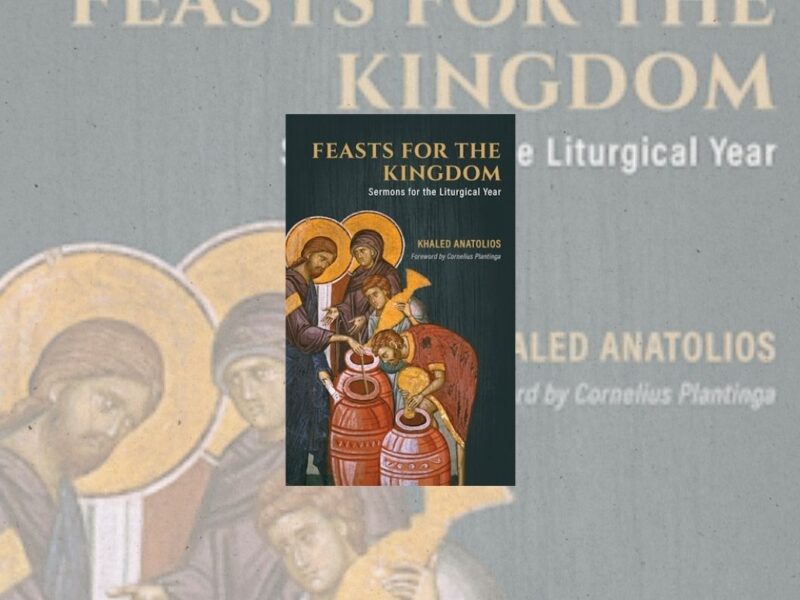Baptism and the Anglican Reformers. By G. W. Bromiley. Cambridge, UK: James Clarke and Co., 2023. 258 pp. $97.50 (cloth), $33.75 (paper).
G. W. Bromiley is perhaps best remembered as one of the translators and a co-editor (with T. F. Torrance) for the English edition of Karl Barth’s Church Dogmatics. However, he was also an Anglican priest and a prolific scholar in his own right, authoring a number of books on topics such as historical theology and the sacraments. Baptism and the Anglican Reformers was originally published seventy years ago in 1953, in the midst of a “revival of interest in the sacrament of Holy Baptism.” Bromiley seeks to “see [the present situation] in its interconnection with the past, and to bring to the study of it the stimulus which is given by contact with the great thinkers of a great epoch.” He notes that “the investigation has a particular interest because much of the material has a direct as well as an indirect bearing upon the problems which still confront us” (xi). His hope is that “if it is found that in these matters the Anglican fathers and the confessions which they issued involve a substantial identity in doctrine with the other Protestant churches, then a big step will be taken towards the re-establishment of those brotherly relations which were assumed and accepted in the sixteenth century” (xii).
Bromiley’s approach is systematic, treating different aspects of the topic in a logical progression: what baptism is, who participates in it, the nature of the rite, and how grace is conveyed through it. For each point under consideration, Bromiley begins by discussing “traditionalist” (i.e., pre-Reformation) perspectives before turning to the Lutheran, continental Calvinist, and English Reformers. He is careful to highlight both the continuities and discontinuities not only between the “traditionalists” and the Reformers, but also among the different segments of the Reformers themselves. The resulting overview feels compact yet thorough, serving as a solid introduction to perennial questions and controversies pertaining to baptism as they arose during the Reformation.
Although one of Bromiley’s stated purposes in surveying Reformation perspectives on baptism is to illuminate contemporary controversies, he does virtually nothing to contextualize the old debates in a concrete way. He mentions infant baptism and indiscriminate baptism as present-day “general problems” (xi) in the Preface, but for most of the book the reader is left wondering what exactly the upshot of Bromiley’s survey is supposed to be.
Once Bromiley does start drawing out implications at the very end, the conclusions he unfolds are questionable. He begins by observing that the Anglican formularies’ treatment of baptism can be interpreted in multiple ways, e.g., Lutheran, Reformed (i.e., continental Calvinist), and “High Anglican.” By itself this is not a controversial statement. However, he then claims that the Reformed approach “was, of course, the predominant interpretation. Not only the Puritans but from the reign of Edward onwards the majority of Anglican divines accepted a kinship with other Reformed communions on all the main doctrinal questions” (222). The High Anglican approach, meanwhile, “marked a cautious regression towards the traditionalist view” (222–23). Moreover, “If in the sixteenth century the formularies were understood predominantly in a Reformed sense, then that means that there can be no possible disloyalty to the Prayer Book or Articles in contending for the same understanding to-day” (223). Indeed, “The interpretation favoured by the Reformers themselves is surely a legitimate and indeed the most probable and convincing of all the suggested interpretations” (223–24). Finally, “If the formularies were generally understood in the Reformed sense, it is evident that on this issue there is nothing in the confessional statements which constitutes a doctrinal barrier to communion with either the Lutheran or the Reformed churches” (224).
To be clear, Bromiley’s acceptance of a “Reformed” approach involves the denial of baptismal regeneration—infants, upon being baptized, are not all regenerate, but only those who are also elect “according to the predestinating will of God” (204). As he puts it, “The Reformed answer to the question [of the efficacy of infant baptism] is in fact the only satisfactory answer. It admits that the renewal sealed in baptism is only by promise…. The baptismal forgiveness and regeneration is not a work done, except in so far as it is already accomplished in Jesus Christ” (205–206). For Bromiley this is a necessary conclusion in light of his commitment to the doctrine of final perseverance: “Where there is no conversion and continuance, and therefore no final consummation, the proffered benefits of baptism are clearly rejected. There is, therefore, no effective operation of the Holy Spirit, and no true baptism” (206). On this account, baptized infants who become adults and fall away were never truly baptized at all—so it must be, if final perseverance is true. Thus when the Order for Baptism directs the priest to say after he has administered the water, “Seeing now, dearly beloved brethren, that this child is regenerate,” “is” does not really mean “is.”
It is on the supposed grounds that the classical Anglican approach to baptism is “Reformed” that Bromiley closes by reiterating the call for renewed inter-Protestant union with which he began the book:
If the Church of England is to become a real bridge-church and not an island-church, and if its members are to make genuine progress towards that reunion which so many of them profess to desire, a first and very practical step is to reacknowledge this doctrinal affinity and the existing obligation of intercommunion which at one time it was thought to entail. (224)
It is a mystery why Bromiley thinks it necessary to accept final perseverance and reject baptismal regeneration in order to enable a healthy recognition of doctrinal affinity between Anglicanism and other Protestant denominations. It is also unclear why Bromiley speaks as though the issue of baptism is the only impediment to Protestant reunion, as if there are not other significant points of doctrinal and ecclesiological disagreement. That said, it is still the case that Bromiley’s survey of approaches to various aspects of baptism before and during the Reformation is interesting and informative. Readers should just bear in mind that it is not necessary to accept his conclusion that the “Reformed” approach is “the most probable and convincing of all the suggested interpretations.” Any assessment of Anglican identity that describes the approach of Richard Hooker as a “regression” demands scrutiny at best.





'Book Review: “Baptism and the Anglican Reformers”' have 3 comments
May 16, 2023 @ 4:22 pm Philip Enarson
Excellent article. Question? How best is Richard Hooker’s position on Baptism defined in contrast to Bromiley’s?
May 18, 2023 @ 8:50 am James Clark
In brief, I’d say Hooker affirms baptismal regeneration while Bromiley denies it. That doesn’t capture everything, but Hooker’s treatment of baptism can be found in his Laws of Ecclesiastical Polity, Book V, sections LVII-LXV: http://ofthelaws.com/book_5.html#57
May 18, 2023 @ 9:50 am Philip Enarson
Thank you James.